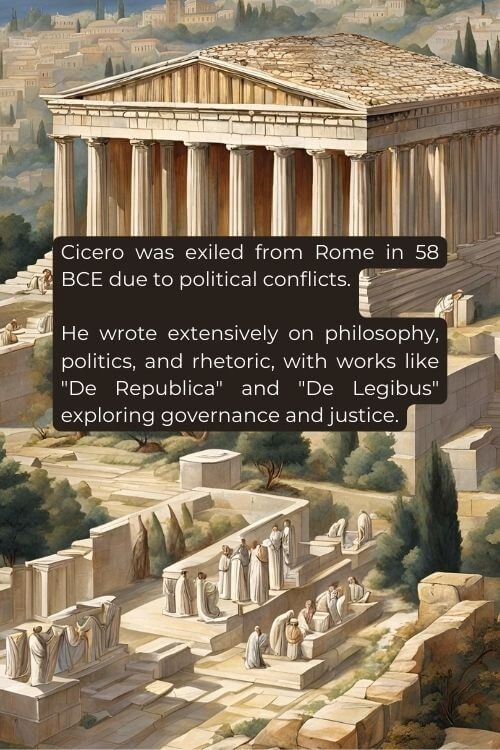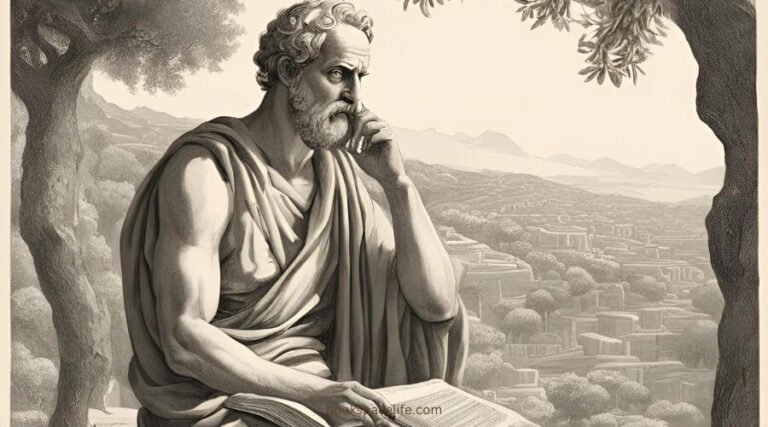Thales of Miletus
Cicero: The Philosopher, Statesman, and Orator of Ancient Rome
Marcus Tullius Cicero (106–43 BCE) stands as one of the most prominent figures in Roman history, celebrated for his eloquence, political acumen, and philosophical contributions.
As a statesman, orator, and philosopher, Cicero played a crucial role in shaping the intellectual landscape of his time and has left a lasting legacy that continues to influence Western thought.
This blog post delves into Cicero’s life, exploring his birth, travels, early education, philosophical ideas, and the profound impact he has had on philosophy and political thought.
Quick Read
Table of Contents
(1) Early Life and Education
Cicero was born in Arpinum, a town in central Italy, on January 3, 106 BCE. His family belonged to the equestrian order, a social class in Rome that was wealthy but not part of the senatorial elite.
Despite his relatively modest origins, Cicero’s family valued education and ensured he received a comprehensive upbringing.
Cicero began his studies in Arpinum, where he demonstrated exceptional talent. He later moved to Rome to further his education.
Here, he studied under some of the greatest minds of the time, including Philosophers Philo of Larissa and Diodorus Siculus. His education included rhetoric, philosophy, and law, equipping him with the skills that would later define his career.
In addition to formal education, Cicero traveled extensively throughout Greece and Asia Minor to study philosophy and oratory. His time in Athens exposed him to the teachings of the Academy, particularly the ideas of Plato and the New Academy.
These experiences profoundly shaped his philosophical outlook, blending elements of Greek philosophy with his own thoughts.

(2) Political Career and Philosophy
Cicero’s political career began in earnest in the 90s BCE when he held various public offices, including quaestor, aedile, and praetor.
His most significant achievement came when he served as consul in 63 BCE. During his consulship, Cicero confronted the conspiracy of Catiline, a plot to overthrow the Roman Republic. His speeches against Catiline were famous for their rhetorical brilliance and established Cicero as a formidable orator and statesman.
Cicero’s political activities coincided with his philosophical pursuits. He sought to apply philosophical principles to political life, advocating for justice, the rule of law, and the welfare of the state.
He believed that philosophy should guide political action, and his writings reflect this conviction.
Cicero’s philosophical works can be categorized into several key areas:
- Ethics: Cicero was deeply influenced by Stoicism and the Platonic tradition, which emphasized the importance of virtue and moral character. He believed that the highest good is the cultivation of virtue and that a just society must be grounded in ethical principles.
- Natural Law: Cicero was a strong advocate for the concept of natural law, which posits that there are universal moral principles that govern human behavior. He argued that these laws are inherent in nature and accessible to human reason. This idea would later play a significant role in the development of Western legal and ethical thought.
- Rhetoric and Oratory: Cicero is often regarded as one of the greatest orators in history. His treatises on rhetoric, such as “De Oratore”, explore the art of persuasion and the role of the orator in society. He believed that effective communication is essential for political leadership and civic engagement.
- Political Philosophy: Cicero’s works on politics, including “De Re Publica” and “De Legibus”, discuss the nature of the state, the ideal government, and the responsibilities of citizens. He emphasized the importance of a mixed constitution, incorporating elements of monarchy, aristocracy, and democracy to achieve stability and justice.
- Philosophical Dialogue: Cicero wrote many of his philosophical works in the form of dialogues, a format he borrowed from Plato. This method allowed him to present complex ideas in a more accessible manner while engaging in philosophical debates with fictional interlocutors.
(3) Influence and Impact
Cicero’s influence on philosophy, politics, and rhetoric cannot be overstated. His ideas have shaped Western thought for centuries, and his legacy continues to resonate today. Some key aspects of his influence include:
- Roman Philosophy: Cicero played a crucial role in introducing Greek philosophical ideas to the Roman world. His translations and adaptations of Greek texts made philosophy more accessible to Roman audiences and laid the foundation for Roman intellectual tradition.
- Natural Law and Ethics: Cicero’s concept of natural law has profoundly influenced legal and ethical thought throughout history. His assertion that moral principles are universal and discernible by reason has been echoed by later philosophers, including Thomas Aquinas and John Locke. The idea of natural rights, foundational to modern political theory, can be traced back to Cicero’s writings.
- Rhetoric and Communication: Cicero’s contributions to rhetoric have shaped the study of oratory for centuries. His emphasis on the importance of style, delivery, and persuasion remains relevant in modern public speaking and communication practices. Many principles outlined in his works on rhetoric are still taught in contemporary communication courses.
- Political Theory: Cicero’s vision of a mixed constitution influenced later political thinkers, including Montesquieu and James Madison. His ideas about the responsibilities of citizens and the importance of civic engagement resonate in modern democratic thought, emphasizing the role of individuals in the political process.
- Humanism and Renaissance Thought: Cicero’s writings experienced a resurgence during the Renaissance, when humanist scholars sought to revive classical texts. His emphasis on human dignity, moral integrity, and the pursuit of virtue became central themes in Renaissance philosophy and literature.
- Influence on Christianity: Cicero’s writings were also influential in the early Christian church. His ideas about natural law and morality were adopted and adapted by Christian thinkers, particularly Augustine. The synthesis of Cicero’s philosophical principles with Christian doctrine helped shape Western moral philosophy.
- Legacy in Education: Cicero’s works have been foundational in the education of generations of scholars, statesmen, and orators. His writings have been studied in schools and universities for centuries, highlighting the enduring relevance of his ideas in the realms of philosophy, politics, and rhetoric.

(4) Conclusion
Cicero remains a towering figure in the history of philosophy and political thought. His contributions to ethics, natural law, rhetoric, and political philosophy have left an indelible mark on Western civilization.
As a philosopher and statesman, Cicero exemplified the idea that philosophy should inform public life and guide moral action.
In a world that often grapples with ethical dilemmas and the complexities of governance, Cicero’s teachings serve as a reminder of the importance of virtue, reason, and civic responsibility.
His call for the pursuit of justice and the cultivation of moral character resonates as powerfully today as it did in ancient Rome.
As we reflect on Cicero’s legacy, we are inspired to engage thoughtfully with the philosophical questions that shape our lives and societies.
His belief in the power of reasoned discourse, ethical living, and the pursuit of the common good remains a guiding light for those who seek to navigate the complexities of the human experience.
Cicero’s life and work invite us to consider how we can contribute to a more just and virtuous society, grounded in the principles of reason, respect, and integrity.
(A) 7 Quick Facts on Cicero
- Birthplace – Cicero was born on January 3, 106 BCE, in Arpinum, a town southeast of Rome, into a wealthy equestrian family.
- Education – He studied rhetoric and philosophy in Rome and later in Greece, influenced by notable philosophers like Philo of Larissa.
- Political Career – Cicero became a prominent orator and statesman, serving as consul in 63 BCE and gaining fame for his speeches.
- Exile – He was exiled from Rome in 58 BCE due to political conflicts, particularly for his role in executing Catiline’s conspirators.
- Literary Contributions – Cicero wrote extensively on philosophy, politics, and rhetoric, with works like “De Republica” and “De Legibus” exploring governance and justice.
- Travel – He traveled to Greece and Asia Minor, enhancing his knowledge of philosophy and rhetoric, and meeting influential thinkers.
- Death – Cicero was assassinated on December 7, 43 BCE, during the power struggles following Julius Caesar’s assassination, marking the end of the Roman Republic era.
(B) 10 Quotes attributed to Cicero
- The safety of the people shall be the highest law. Emphasizing the importance of protecting the welfare of citizens.
- A room without books is like a body without a soul. Highlighting the significance of literature and knowledge in enriching life.
- Gratitude is not only the greatest of virtues but the parent of all the others. Suggesting that gratitude underpins all other moral virtues.
- Justice is the crowning glory of the virtues. Indicating that justice is fundamental to a virtuous life.
- In times of war, the law falls silent. Reflecting on the challenges of maintaining justice and order during conflict.
- The wise are not wise because they know everything, but because they know how little they know. Highlighting the value of humility and awareness in wisdom.
- Freedom is the right to live as we wish. Defining freedom as the ability to make personal choices.
- While there’s life, there’s hope. Expressing the idea that as long as one is alive, there is potential for change and improvement.
- We are all created for friendship. Emphasizing the inherent social nature of humanity.
- The life of the dead is placed in the memory of the living. Suggesting that our legacy and influence endure through those who remember us.








